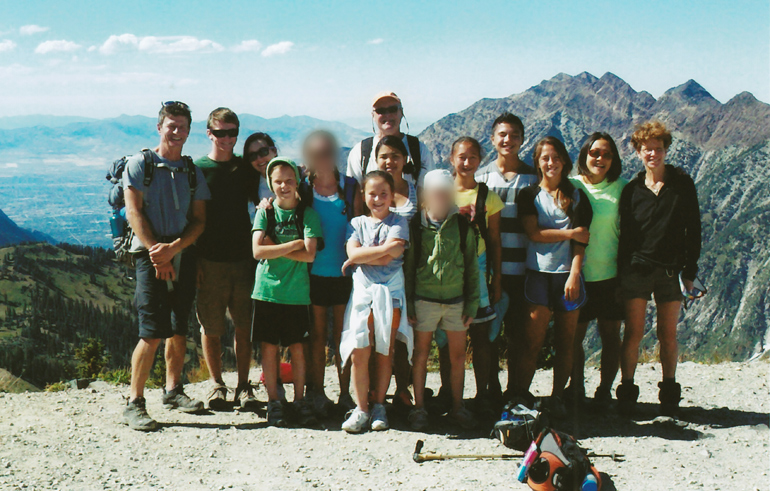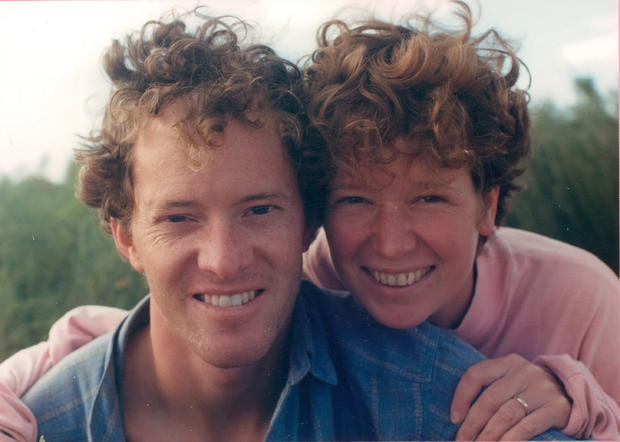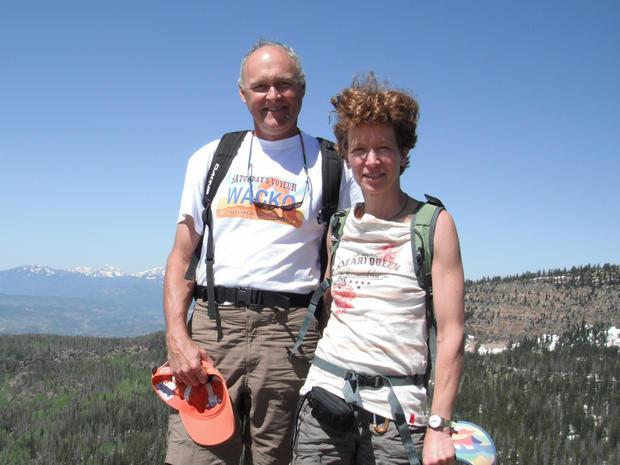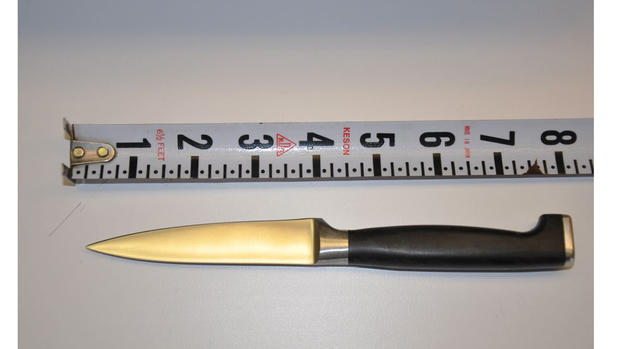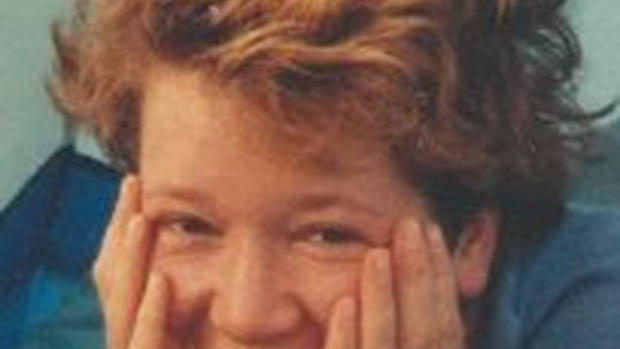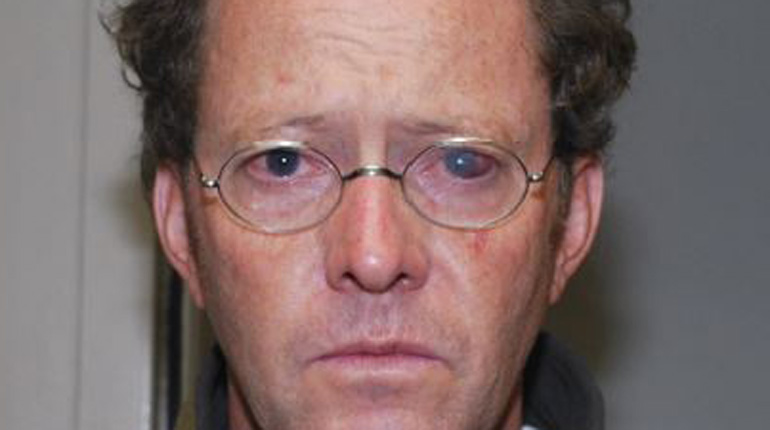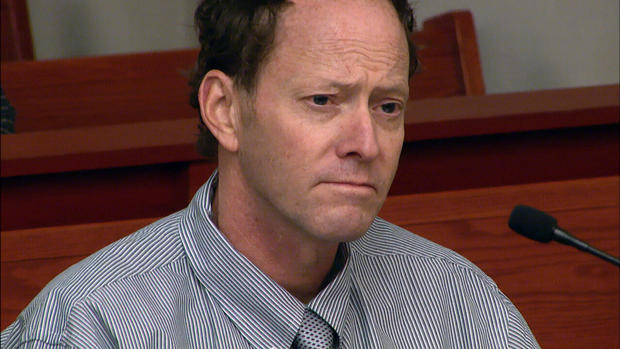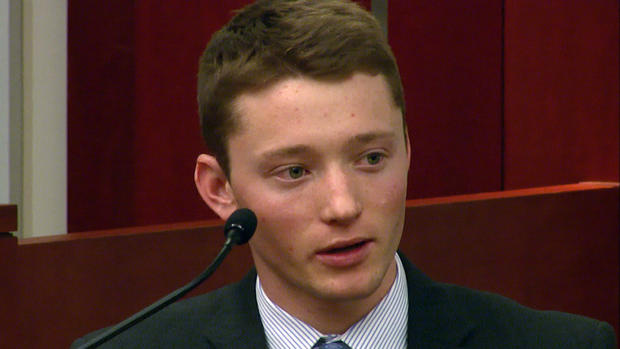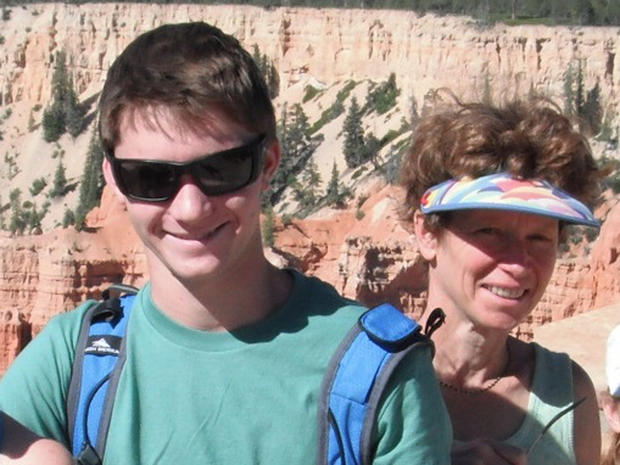Father and Son: The Verdict
Produced by Marcelena Spencer, Aimée deSimone, Josh Gelman, Avi Cohen and Bill Kerig
The majestic mountains high above Salt Lake City have been a playground for 19-year-old Pelle Wall and his family since his childhood.
"September 25th, 2011, was -- one of the ... last days of my mom's life. ...We were up there camping... We loved to get out in the outdoors. My mom was always pushing when we were young, taking us out on hikes," Pelle told "48 Hours" correspondent Susan Spencer.
"It was a beautiful day ... I think the leaves may have been changing ... just gorgeous," he continued. "We have a picture with all of us, you know, the whole group all together."
He treasures that picture from September 2011, the last time he and his mother, Uta von Schwedler, ever would be in these mountains together.
"I definitely feel that that is a special place. You know, that's one of the last places I was with her. It's ... beautiful. And, so, I do feel that there's some sort of, like, special connection-- up there on the peak.
Two years later, Pelle, his younger brother and sister, and family friends gathered to celebrate her life.
The gathering offered comforting words but little real consolation, as was clear when Pelle read a message from his brother, Liam, remembering their mother.
"One day I was saying see you soon ... and the next day my world was flipped upside down with the police on my doorstep. No one knew if it was a suicide, an accidental death or a homicide," Pelle addressed the crowd.
"For a very long time I -- I just could not process it. It was really traumatizing," Pelle told Spencer.
One person not on hand to recall those dark days -- Uta's ex-husband and father of their children, Johnny Wall.
"When I was very small ... we actually lived in Malibu ... right next to the Walls," said Klaus Fiebig, Johnny Wall's childhood friend.
"Is it stretching a point to say that he was like a brother to you?" Spencer asked Fiebig.
"No. We really became tight," he replied.
Years later while in grad school, Fiebig introduced Johnny to Uta, who had moved to California from her home in Germany to study biology.
"And it clicked with them and they became a couple. And I thought, 'What a wonderful thing,' where you have two good friends and you introduce them and it works," he said.
And it did work, at least for a while. Five years after they married in California, the couple moved to Salt Lake City, with one-year-old Pelle in tow. Both Johnny and Uta had jobs at The University of Utah Medical Center -- he as a resident in pediatrics and she as a research scientist studying HIV.
"One of her papers had been ... actually recognized as one of the most -- I think it was the 30 most prominent HIV papers in the last 30 years," said Pelle.
Biomedical researchers Heidi Schubert and Orly Ardon met Uta von Schwedler during her early days in the labs.
"We had this chemistry. You know, she looked at me, I looked at her, and that's it," Ardon recalled. "We were friends."
"She was passionate about learning a lot of stuff and just being involved," Shubert said. "She was always, like, calling you up, 'Hey, do you want to go to the reading of that play? Do you want to go to the dance performance? Do you want to go to concert?'"
But Uta's true passion was her four kids.
"She was a combination of a soccer mom and a working mom. She would run from the lab home on her bike, get into the car and drive the kids to a soccer game ... run back, take another kid to wherever they needed," said Ardon.
Dr. Wall was busy as well, building his practice as an extremely well-liked and well-respected pediatrician.
"He was a fabulous pediatrician," said Wendy Wall, Johnny's older sister. "His patients loved him."
Wendy remembers how excited her brother was to be a father.
"I think nothing in his life made him happier than being a dad. He's someone who just loves kids," she said.
It was, on the surface, a perfect family. Beneath the surface, it was a very different story.
"I think there were a lot of issues -- a lot having to do with us children," said Pelle.
"I know that all the kids struggled with their mother," Fiebig explained. "Uta was a lovely person, but she could be really awful at times too."
"Your father alleged that she was physically abusing the children," Spencer noted to Pelle.
"She had disciplined us from time to time. I had been hit when I was younger. But it was something that was when I was very young -- but not something that continued," he said.
"I think Uta is somebody who very much loved her children, but I also think she really, really wrestled with maternal responsibilities and with being a mom," sad Wendy Wall.
In fact, years later, Uta would end up in family court several times, once accused of actually biting her youngest son.
"How the story goes, I suppose, is that my brother Liam was on top of the -- her car. And she -- my mother was trying to get him down. And somehow she had bitten him," Pelle explained.
Uta always denied it, but did go for court ordered counseling. But the marriage was in trouble long before that.
"Johnny told us that Uta was having an affair. She was having an affair with another scientist in Germany. And he was obviously very upset about this," said Wendy.
"The question of this affair was something that my dad did bring up regularly," said Pelle.
"I think that was very, very tough for Johnny," said Fiebig.
And it only got worse when, in 2006, Uta ended the marriage, leaving behind her four children, ages 5 to 12.
"Ultimately Uta walked out. She had an affair with somebody else // and she walked out on Johnny and her kids," said Wendy.
"I recall being told that she was moving out and being very upset by it. But I do very distinctly remember thinking that it was not for the worst that -- that they were splitting up," said Pelle.
They tried to work out a flexible custody plan, with the kids living with their father most of the time. It didn't work. And rising tensions soon became the backdrop to tragedy.
A FAMILY DIVIDED
"I've always considered myself a happy person. Of course, ups and downs, you know, it was hard times, happy times. But I'd say on the whole, I'm-- I'm very happy," Pelle Wall told Susan Spencer.
A real achievement for Pelle, given his family history: a perfect storm of abuse charges, family fights and finally divorce.
"My defense mechanism for myself is looking at everything as dispassionately as I can, so not trying to get super emotionally involved," he explained.
Apparently it worked. Despite his volatile home life, Pelle excelled in school.
"I got a 4.0 G.P.A. So I had all As. And I was awarded academic all-state for soccer," he said.
It wasn't easy with mom and dad living in separate homes.
"After the divorce we spent most of our time with my father," Pelle told Spencer. "It was probably a couple times a week switching between houses -- which was very stressful. It's something that we hated doing. None of us wanted to do it."
"But it sounds on the other hand as if they were struggling to do something that was fair," Spencer noted.
"My dad very much wanted us to spend time with my mom, which was very good," said Pelle.
But Dr. Wall's good will didn't last very long.
"As he became more confrontational with my mother I think -- I really -- I viewed him less and less as a good father," said Pelle.
"He was frustrated with Uta. Sometimes she would -- be supposed to take the kids for a weekend or something, and she would make other plans. And-- drop them at his doorstep," said Wendy Wall.
Even the family's history became a major source of dispute.
"I don't quite understand how the scrapbooks became so contentious," Pelle told Spencer. "The scrapbooks were something that my mom very much cared about."
"The scrapbooks were filled with photos that Johnny had taken. Johnny was the family photographer. And-- they were organized by Uta," Wendy explained.
"She would stay up late and just put everything in order and try to remember and write everything down," said Schubert.
"So these scrapbooks really meant something?" Spencer asked.
"Oh yeah," Ardon replied.
"They were in the original divorce document," said Schubert.
"My dad used those scrapbooks to control her," Pelle explained. "'So I'm not gonna give you the passports unless you let me have the scrapbooks.' Or, 'I'm not gonna give the scrapbooks back until you give me the passports or that kind of thing.'"
"That's very odd," said Spencer.
"It's very odd. It's -- it's not normal," said Pelle.
Their battle lasted more than five years, during which time Johnny Wall remarried and divorced again.
"His second wife had also left him," Fiebig explained. "And -- and he was blaming it all on Uta."
"It might have been the end of 2010 that ... he was giving her the years warning and he was going to move away and take the kids," said Nils Abramson.
It was also in 2010 that Nils Abramson, a local therapist and social worker, began a relationship with Uta.
"She had a very brisk kind of walk. And always smiling," Abramson said. "You know, she had the -- 10 different colored watch straps so they could match her socks."
Abramson said Uta enjoyed life to the fullest and wasn't shy about speaking her mind.
"She would tell a stranger, 'you need to put sunscreen on,'" Abramson laughed. "That's very funny," said Spencer.
"It's like ... you know, that's not offensive. But it's -- it's getting into somebody's business you don't really need to," Abramson continued.
And Abramson says he saw firsthand the lengths to which Johnny Wall would go to provoke his ex-wife.
"At one point he shut off his home phone," he said. "After that ... she said, 'I'll buy the kids phones.' So she bought the service for all the kids. And then he would try to interrupt that too."
"In his life, the center was, 'What can I do to hurt Uta,' more than, 'What can I do to help my kids,'" said Fiebig.
But in those last months, friends say Uta was getting her life together ... just as Johnny was losing control of his.
"The household was terrible," Fiebig told Spencer. "He didn't -- he didn't have the heat on. ... Everything was messy. ...It looked like somebody -- a homeless person -- sleeping, almost."
"Really? It was that bad? You're not exaggerating?" Spencer asked.
"No, it was very, very bad," Fiebig replied. "That was when I really realized, 'Wow, this is getting very crazy.'"
In early 2011, Uta had had it, and went to court hoping to win primary custody of her children.
"They were pretty much hostages in this battle. And I think it got to a point in which the kids had to be taken out," Ardon said. "And she was aware she needed to do that."
Finally, in September, an agreement was reached to review the children's custody arrangement.
"So she thought that there was gonna be a change here?" Spencer asked Ardon.
"I think that she thought-- she was pretty sure that things would change," she replied.
Unfortunately she was right. Five days later, everything changed.
On Tuesday, Sept. 27, 2011, the kids were staying with Johnny and Abramson and Uta looked forward to a quiet evening alone.
"I went in like I normally would and heard the water running and tapped on the door and said, 'Hello? Hello?' And opened the door and there she was under water and ... You know, I grabbed her arm, pulled her out of the water part way, and as soon as I lifted her up -- she was stiff and I knew," said Abramson.
"You didn't have any doubt," said Spencer.
"I knew she was dead," said Abramson.
The street where Uta von Schwedler lived was teeming that night with Salt Lake City police, homicide detectives, crime scene investigators, and the local media. They all had one basic question: how is it possible that a bright, vivacious, very fit 49-year-old woman could drown in her own bathtub?
"I thought she might have slipped and hit her head," said Abramson.
Investigators found no sign of a break-in and no valuables missing from the house. What they did find in the tub of cold water, along with Uta's body, was a kitchen knife and, oddly, one of those treasured photo albums -- evidence that seemed to hint at suicide.
"You know, when they suggested that, I was blown away," Abramson said. "I mean--"
"As far as you're concerned, this is impossible," said Spencer.
"Oh, yeah. Yeah. I mean, completely impossible," said Abramson.
Abramson told police there was another explanation that made a lot more sense.
"I told him everything that, you know, that I had done, that I knew about. And it's like, 'Did she have any enemies?' It's like, 'Well, yes, probably, her ex-husband,'" he said.
That very night, investigators picked up 47-year-old Johnny Wall for questioning.
"Johnny was awakened in the middle of the night -- dragged out of bed, hauled down to the police station, told by police detectives that -- his wife was dead -- his ex-wife was dead-- and then interrogated for four hours," said Wendy Wall.
Dr. Wall appeared shocked and overwhelmed:
Johnny Wall: I'm just trying to be honest but you guys are saying something really horrendous...
Detective Ita: It is really horrendous. Somebody died. Somebody is not here anymore.
Johnny Wall: Yeah, and I can't grieve because you are yelling at me...
Johnny Wall waived his rights to an attorney during the police interrogation, but later hired Fred Metos as his defense lawyer.
"...partway through the interview -- Johnny makes a statement, 'I was asleep,'" Metos told Spencer. "And then it's like a light goes on with these two cops. And they start in with the, 'Well, we have a witness who saw ya there.' And that was a total lie."
Johnny Wall: Don't you think I'd remember if I went over to her house?
Detective Ita: ...Apparently not. You don't remember a lot of things...
Johnny's memory seemed fuzzy and detectives were frustrated:
Detective Ita: Did you go over to her Uta's house between Thursday and the time you picked the kids up?
Johnny Wall: I don't remember...
Detective Hardin: Are you ... how did you pass grade school?
"The following morning ... my dad walks in trailed by my three siblings. And then he told me that my mother was dead and that he was a suspect," said Pelle.
Stunned by the news himself, Pelle could hardly believe his father's reaction.
"It was out of control. He essentially started acting like an infant. You know, he's laying on my bed in the fetal position crying, saying, you know, 'I want my mommy," Pelle explained. "...having us, like, comfort him -- you know, a whole lot of things about, you know, 'Is this a dream? I just wanna wake up. Am I monster? Could I have done this?'"
A traumatized Dr. Wall checked himself into a psychiatric hospital, leaving his son to answer those questions.
"I was absolutely 100 percent convinced that he was responsible for my mother's death," said Pelle.
HOW DID UTA DIE?
The medical examiner's report on Uta von Schwedler's death -- six weeks in the making -- gave the cause as "drowning," but left how she drowned as "undetermined." Johnny Wall had his own theory.
"Did he tell you that this was suicide?" Susan Spencer asked Pelle of his father.
"He did," Pelle replied. "I think a couple times at the dinner table it came up. And he basically said that -- that your mom chose to leave you, that it was a choice that she had committed suicide."
Pelle wasn't buying it.
"As I thought about ... my dad's behavior before and after her death, it became more and more apparent to me that -- that he was responsible for killing her," Pelle told Spencer.
Several aspects of the case baffled investigators. Uta had superficial knife wounds on her leg and one wrist, and she also had a high level of the antianxiety medication Xanax in her system.
"Did she ever take antidepressants? Did she ever take antianxiety medication?" Spencer asked Abramson.
"No, I mean she used recreation and exercise as her mental health drug," he replied.
"She was at about twice a therapeutic level," defense attorney Fred Metos told Spencer. "It's clearly enough to make her drowsy, maybe render her unconscious. And if she's trying to get into a bathtub ... it's not that hard to drown."
But police grew more suspicious of Dr. Wall when it was learned that, just months before Uta's death, he had written a Xanax prescription for his mother.
"The mother had said she didn't recall receiving it ... then when they talked to the dad later, the dad said, 'Yeah we got it. And I got rid of it,'" Metos explained.
The time of Uta's death was put at sometime after 10:30 p.m. Monday, September 26. As for what Johnny Wall was doing early the next morning ...
"The whole time that I was awake and home -- before I went to school he was not home," said Pelle.
"And that was unusual?" Spencer asked.
"That was unusual," Pelle replied.
Johnny did turn up that morning just in time to drive his younger children to school. Then at 8:30 a.m., he had his car washed, as seen on security tape.
"From what I read, at least, he didn't strike me as somebody who was particularly meticulous," Spencer noted to Metos.
"He was about some things," he replied.
That afternoon, before his mother was found, Pelle noticed something odd about his dad.
"He had this terrible scratch, you know, blood on -- on the side of his eye," he told Spencer.
"I mean, this was-- a serious eye injury?"
"It was a serious eye injury, yeah," Pelle replied. "He said that he had been sleeping on the porch the night before and that Molly, our dog ... accidentally scratched him in the eye."
"Was that something that he did very often?" Spencer asked.
"This whole sleeping on the porch thing was not something I ever saw him do," Pelle replied.
"Including that night."
"Including that night," Pelle affirmed.
If Pelle's fears were true -- that his father killed his mother -- then he and his siblings were now living with a murderer.
"Part of the reason I was concerned for my safety as well as my sibling's safety -- was that I saw this anger that he had towards my mother," Pelle explained. "It didn't die with her. It jumped and it expanded."
"And you really didn't feel safe," Spencer commented.
"I really didn't feel safe. This was -- this was not a superficial concern. This is 'I might die,'" said Pelle.
But Salt Lake City authorities made no effort to remove the children from Johnny Wall's care, and the police investigation stalled.
"For a long time ... I was just hoping that the police would make the arrest and that once the arrest was made then everything could move forward. The kids would be safe," Pelle explained. "And it didn't happen."
And so in January 2012, one day before his 18th birthday, Pelle Wall packed his bags and moved out of his father's house, leaving his siblings behind.
"I realized that my presence there was not protecting my siblings," he told Spencer. "And once I had that realization and I moved out, then I could take active steps to protect them."
"And your father's reaction to this was?" Spencer asked.
"Nothing positive -- not a positive reaction. He was extremely upset," said Pelle.
He sought refuge with the family of his best friend, Jessica Oglesby, whose parents, Amy and John, already had six kids and yet welcomed Pelle with open arms.
"He didn't have the support necessary to help him do what he really wanted to do," said Amy Oglesby.
"Which was?" Spencer asked.
"Was to have the children remove -- removed from their father's care," Oglesby replied. "And he asked for my help. And I helped him."
Pelle then turned to the courts, beginning a vicious tug of war over custody of his siblings and eventually winning.
"So they were removed from my dad's care. And they lived with a series of, essentially, family friends," said Pelle.
A victory for Pelle, but the war was far from over. His dad sued him for those treasured scrapbooks. Pelle fought back with a wrongful death suit, holding his father responsible for his mother's death.
That meant Pelle's lawyers, could question Johnny Wall, directly, and under oath:
Attorney Margaret Olsen: Have you ever told anyone that you would be better off if Uta was dead?
Johnny Wall: No, that wouldn't be true.
When questioned by police just hours after Uta's death, Johnny's memory had seemed to fail him:
Johnny Wall: But don't you think I'd remember if I went over to her house?
Detective Ita: Apparently not. You don't remember a lot of things...
But 18 months later, in a deposition for Pelle's suit, it was much better.
"I don't know why she was there. I think she was probably looking for something," Wall stated.
He now told an elaborate story about discovering Uta in his house in the early morning hours of the day she died:
Margaret Olsen: Can you tell me what was in your house that Uta may have wanted?
Johnny Wall: An old coffee bag.
"Coffee bags?" Spencer asked Metos.
"Well, coffee bags because she had told him previously that she had put some substance in one -- in the coffee that caused his second ex-wife to have a miscarriage," he explained.
"Run that by me again?" Spencer asked quizzically.
"Yeah. And - and [laughs] I don't know why he said that," Metos said. "That's what he said in the deposition. And that's - and -- and, again, that was speculation on his part."
The problem is the miscarriages were in 2008, three years before Uta died. And Johnny's then-wife said she never even drank coffee when she was pregnant.
"There were a whole lot of new stories that we hadn't heard -- contradictory statements ... newfound tales that he's spinning in front of me," said Pelle.
DNA results from the crime scene, including from under one of Uta's fingernails, didn't clarify things, showing only a positive match to a male in the Wall family.
"So your contention is that this DNA is absolutely meaningless?" Spencer asked Metos.
"It's meaningless," he replied. "Johnny has the same DNA as his two sons".
But with the knife wounds, the Xanax and Johnny's own words, investigators felt they had a solid case. On April 25, 2013, more than a year-and-a-half after Uta was found dead in her bathtub, Johnny Wall was arrested and charged with her murder.
"So what was it like then, when finally, after all this time, he was actually charged?" Spencer asked Pelle.
"Exhilarating. A huge relief," he replied. "I couldn't believe that it had happened."
"I felt devastated. I think we all did. It was just -- it was -- it was an incredible tragedy," said Johnny's sister, Wendy.
On Feb. 18, 2015, the doctor -- now the defendant -- would stand trial.
"Ladies and gentlemen, there is only one person who did this to Uta von Schwedler ... the defendant," Prosecutor Anna Rossi addressed the court.
"...Ladies and gentlemen, the evidence is going to show you that those knife wounds were self-inflicted. That the Xanax was most likely voluntarily injected. And without those facts, it's clear the death was not a homicide..." defense attorney Fred Metos told the court.
Soon, a jury will decide how Uta von Schwedler really died.
A FATHER ON TRIAL
His campaign to see his father tried for murder has cost Pelle Wall emotionally and financially.
"It's essentially my entire inheritance from my mother," he said.
Pelle says he has no regrets, but his aunt Wendy Wall, Johnny's sister, regrets everything he's done.
"I think that Johnny felt devastated when, you know, when Pelle -- in some ways you could say turned on him, I suppose," Wendy said. "Everybody in our family Johnny included, still very much loves Pelle, and I think that we're all trying to remember that ... he's gone through incredible trauma."
The culmination of Pelle's efforts -- the murder trial of his father - leads off with testimony from the man who made the grisly discovery of Uta's body. Her boyfriend, Nils Abramson, told Prosecutor Matthew Janzen what else he found:
Nils Abramson: This is Ilona's personal scrapbook album.
Prosecutor Matthew Janzen: You indicated that this photo album was in the tub?
Nils Abramson: In the tub, yes. ... it was floating by her feet, by the cold water shutoff.
"This was a long time in coming. What was your general state of mind when the trial began?" Spencer asked Abramson.
"Apprehensive, but completely ready" he replied.
Abramson's cross examination was rough as defense attorney Fred Metos zeroed in on him as a possible suspect:
Defense attorney Fred Metos: Did you turn the body?
Nils Abramson: I don't recall.
Fred Metos: Let me have you read the beginning with the fire department ... Does that refresh your recollection as to what you said to Wilkinson then?
Nils Abramson: Yes, it does
Fred Metos: And did you in fact tell him that you rolled the body?
Nils Abramson: It says right there I did.
"It was implied that you might be a murderer," Spencer commented to Abramson.
I knew that would come up," he replied. "I wasn't sure if would come up the way it did. But ... I misspoke in my first statement."
To clear up any confusion, the prosecutor asks Abramson one simple question:
Matthew Janzen: Did you kill Uta von Schwedler?
Nils Abramson: No.
Now 21, Pelle, a prosecution witness, was given special permission by the judge to sit through all the testimony. He'd waited more than three years for this day.
"Did you approach the stand thinking, 'I'm not going to look at him' or 'I'm going to look right at him?" Spencer asked Pelle.
"I knew that I'd look at -at my dad, at some point on the stand," he replied, "but I think most of what I was focusing my attention on was talking to the jury.
"So I was in my bedroom getting my stuff ready to go and my dad came in trailed by my three younger siblings... They were all kind of like crying, obviously very distraught, very upset ... And my dad said, 'Uta's dead and they think I did it,'" Pelle testified.
Pelle told the jury about his father's bizarre behavior: "So he was kind of just babbling and rambling. But he was saying things along the lines of, 'Am I a monster?' ...'What if I did it and I remember?' I think he also said, 'I want my mom or I want my mommy,' at one point."
Defense attorney Metos, treading lightly, suggested Pelle didn't really know much about his parents' relationship or why they fought:
Pelle Wall: I feel like I heard about the divorce decree quite a bit. I don't know that I actually read it myself.
Fred Metos: ...the bottom line is you really don't know in terms of what the court had ordered, what your dad was entitled to?
Pelle Wall: At the time or now?
Fred Metos [smiling]: At the time.
Pelle Wall: I may have known that they were shared property ... I may have known that ... I'm not 100-percent sure though...
With a circumstantial case and no direct evidence against Dr. Johnny Wall, the trial soon became a battle of expert witnesses.
Prosecution blood expert Rod Englert told the jury that Uta fought desperately to live, despite high levels of Xanax in her system:
Rod Englert |Blood stain expert: This comforter is consistent with a violent struggle. There's some violence goin' on. ...There's a struggle ... more than one person..."
Rod Englert: Uta rallied and was fighting back --
Prosecutor Anna Rossi: In the bathroom?
Rod Englert: In the bathroom.
Uta stopped fighting when the Xanax kicked in, prosecutors believe, theorizing that it was injected by Dr. Wall, who crushed the pills and mixed them with alcohol. Ridiculous, says the defense: Uta took the Xanax herself and the bloodstains don't contradict that.
Fred Metos: Could they tell you if someone rallied after being unconscious or unalert?
Anita Zannin|Defense blood expert: No.
Fred Metos: Could you conclude -- conclusively determine if there was a struggle?
Anita Zannin: I could not. ...There's some movement, but what caused it, whether it was one person, two people, 10 people, I can't answer that.
Another defense expert, forensic pathologist Judy Melinek, said the knife wounds on Uta's leg and wrist do tell a story.
"None of the wounds are fatal, they are superficial." Melinek testified. "The fact the knife is underneath her is in my opinion most likely self-inflicted..."
Melinek also had a theory why one of Uta's precious photo albums would be found with her.
"The photo album in the tub ... people who self-injure or commit suicide often have mementos next to them," she told the court.
But when Prosecutor Anna Rossi suggested that the crime scene was staged to look like a suicide, things got heated:
Prosecutor Anna Rossi: If someone came in with intent to murder her and make it look like a suicide they wouldn't stab her there, correct?
Judy Melinek: She's a tough person ... I don't see any injuries on her body that suggest someone restrained her ... in order to inject her ... and even if they did, she's still got multiple minutes where she could fight them off.
Anna Rossi: Your Honor, again I'm gonna...
Judy Melinek: It doesn't make sense.
Johnny Wall did not testify, but his own words on tape when questioned by police were powerful evidence against him:
Detective Ita: I'm asking you a very simple question.
Johnny Wall: I know.
Detective Ita: Did you drive from your house to Uta's house between Thursday and Monday?
Johnny Wall: I don't remember.
"So what did you make of that?" Spencer asked Pelle.
"I think it was suspicious ... he was evading questions," he replied.
Detective Hardin: What traumatic incident could have happened between Thursday and Monday?
Johnny Wall: I don't know.
Detective Hardin: That did happen. You don't know.
"Trying to basically create a scenario that he could wiggle out of," Pelle said of the interrogation.
The defense argued Dr. Wall's memory lapses were natural given that detectives bullied and lied to him for hours.
Detective Hardin: You think this is our first ... rodeo? The reason why you don't want to remember is because you killed her. And we will prove it.
Johnny Wall: How can you say that!?
Detective Hardin: We will prove it.
Johnny Wall: [voice screeches] I didn't do it.
"...trying to look at it from ... someone's perspective -- who doesn't have the background that I do, I think you kind of get sucked in," Pelle explained. "..."And it was only with the contrast of -- of the deposition ..."
Attorney Margaret Olson [Deposition]: Where were you between the hours of midnight and 7:00 a.m. on the night of September 27, 2011?
Johnny Wall: I was initially home ... If I had to guess probably 5'o clock-ish ... I was up by the University of Utah and then I was up in Emigration Canyon.
"Once you've seen both of those, and they were showed back-to-back days ... that's when you really notice, 'Oh, you know, there's really -- there's something wrong," Pelle told Spencer.
The prosecution's final witness, Dr. Marcella Fierro, said based on the medical and psychological history, Uta had no reason to kill herself.
"...this is an organized professional woman, OK. She has four kids, which is enough to drive anybody nuts, but she's not nuts, all right," Dr. Fierro testified. "And yes, several years ago she was upset and she was depressed 'cause she had a pending divorce. That, my friends is normal. That is not mental illness."
With only closing arguments remaining, that issue - Uta's state of mind - may be a major factor when the jury decides the doctor's fate.
SUICIDE OR MURDER?
Four weeks of testimony has come down to two questions: did Johnny Wall kill Uta von Schwedler or did Uta kill herself?
"What was your state of mind?" Susan Spencer asked Pelle Wall of the trial. "How did you feel it had gone?"
"I felt good ... at one point, I was -- I was scared it was going too well. You know, I was afraid something bad was gonna happen," he replied.
"As you've already heard many times, Uta von Schwedler was found dead in her bungalow home," prosecutor Nick D'Alessandro addressed the court. "This was no suicide, Uta was murdered."
"It makes no sense to say, 'These are defensive injuries.' The locations are consistent with them being self-imposed," defense attorney Fred Metos told jurors.
The defense attorney also attacked the testimony of the state's expert witness, Dr. Marcella Fierro, who testified that Xanax would have rendered Uta unconscious.
"I think she used the--expression, 'It was like she would be hit by a board or--or knocked out,' something to that effect," Metos told the court. "Well, if she's unconscious, how do those hand prints show up on the wall? They can't. If she's struggling and fighting, why don't we have more than just the hand prints? ...Just because Dr. Marcella Fierro thinks something happened doesn't mean it did."
"Dr. Fierro didn't say that she got hit by a board when that Xanax was administered. She said that she was hit by a brick wall. And I'll contend that's a Johnny Brickman Wall that hit her and hit her hard," Prosecutor Matthew Janzen told jurors.
As the case goes to the jury, Wendy Wall tells "48 Hours" "I expect Johnny to be vindicated. ...I believe that Johnny will be found innocent."
"For you to prevail, basically, the jury has to believe his story on about five different subjects ... if they doubt any one of them, it sort of falls apart," Spencer commented to Metos.
"No, that's not true. You gotta remember, we don't have to prove anything. The State has to prove beyond a reasonable doubt that he committed it," he replied.
The jury deliberated until almost 9 p.m., and then a verdict.
"We got up and started yelling around the house, 'We have a verdict. We have a verdict," Pelle said. "'Let's go. ...Let's get our stuff on.'"
"I got the text. And I was out the door like a bullet," said Nils Abramson.
In the packed courtroom, members of one family, hope for two very different outcomes as the verdict is read:
The State of Utah vs. Johnny Brickman Wall. ...We the jurors in the above case find the defendant Johnny Brickman Wall as follows: Count 1, criminal homicide murder, guilty.
On one side, warm embraces and tears of joy. On the other, shock and disbelief. For Johnny Wall, there was no obvious emotion at all.
"As soon as that word was read ... there was just this release of breath," Pelle said told Spencer, exhaling.
"It was just like this huge weight had just dropped off. ... Lot of relief, a lot of happiness."
"People are going to hear the word happiness and it's going to be a little jarring -- you know, because this is such a wrenching experience for anyone to have to had gone through," Spencer noted.
"Happiness in the sense of - of -- of safety," Pelle explained. "We can -- we can put this stage of our life behind us."
But no verdict can fill the void.
"I dearly miss Uta's bright engaging smile," an emotional Abramson addressed reporters.
In a written statement, Johnny Wall's family said: "This verdict will not bring Uta back. Now, to that tragedy has been added the conviction of an innocent man."
"I think on some level, he really does believe that -- that he's innocent and at this point, that he was wrongly convicted," said Pelle.
Pelle has his conviction; he would like a confession.
"You don't expect that you'll ever be in a situation where you'll be able to talk to him and just say, 'What were you thinking? Why did this happen?' You know?" Spencer asked.
"I mean, I expect that I will talk to him once he's in prison. But, I mean, I think I can ask him the questions. But, I don't expect that he'll answer. He'll just, you know, shake his head ... and, basically, maintain the victim stance that he's always maintained," Pelle replied.
"But, you do think you'll talk to him again?"
"Yeah. I think I will," said Pelle.
Today, Pelle and his younger siblings consider the Ogelsbys their family.
Although the memories of their mother, Uta, are as enduring as the mountains she loved.
"I think she really enjoyed being up here and being outside in the fresh air," Pelle said from a chairlift.
"How do you want people to remember her?" Spencer asked Pelle.
"I just want people to remember her as a person ... as a real person," he replied. "And I think that the real person -- the real Uta, my real mom, that's who I wanna remember. And that's who I want other people to remember. "
"With the curly red hair?"
"Curly red hair," Pelle repeated with a laugh. "Yeah."
Just a week before her death, Uta von Schwedler had made a breakthrough in the field of childhood leukemia.
Johnny Wall is scheduled for sentencing on July 8, 2015.
